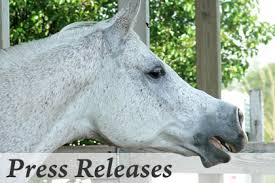Important Advice Following Reports of Wormer Resistance in Horse Tapeworm
Apparent treatment failure has been reported in the USA for both drugs present in tapeworm wormers; praziquantel and pyrantel (Nielsen 2023). These are the only drugs licensed for tapeworm control in horses in the UK. In a bid to clarify how this risk affects tapeworm testing and treatment, Austin Davis Biologics (ADB) have reissued guidance on the use of EquiSal saliva testing to inform on tapeworm control.
EquiSal saliva testing is successfully utilised by horse owners to diagnose infection to reduce the number of tapeworm treatments needed, resulting in more than two thirds of horses tested not needing treatment. This approach reduces the risk of wormer resistance as drug use is saved for horses with potentially disease-causing burdens.
In light of the concerning reports of emerging resistance in the USA, ADB stress the importance of taking the correct action for horses who routinely have borderline or moderate/high EquiSal saliva scores.
Professor Jacqui Matthews, RCVS Recognised Specialist in Veterinary Parasitology and Director of Veterinary Science at ADB, advises, “in horses that report with a borderline or moderate/high saliva score, their management should be evaluated to determine what improvements could be made to help prevent tapeworm reinfection from the pasture. As part of this evaluation, a follow up test can be performed 3 months after treatment to provide information on whether or not reinfection is occurring.”
This advice is based on the fact that tapeworm-specific antibodies reduce relatively quickly over time, with one published study indicating that in over 70% of praziquantel-treated horses, saliva scores reduced to a ‘low’ diagnosis (no treatment recommended) within 5 weeks of horses being wormed (Lightbody et al. 2016). Later studies demonstrated that in all horses grazing fields where dung was removed frequently or horses that were stabled (i.e. very low exposure to new infections), EquiSal saliva scores reduced to a ‘low’ diagnosis within 12 weeks (Matthews et al. 2023).
Jacqui Matthews further recommends that when horses test positive in the follow up test, “improvements in pasture management should be undertaken, and/or a tapeworm treatment considered where appropriate, to prevent further grazing contamination with tapeworm eggs. All co-grazing horses should be tested at the same time in case they act as a continued source of tapeworm eggs. The best approach to prevent wormer resistance is to evaluate and implement improved pasture management to move to a situation where recurring reinfection is considerably reduced”
To support this advice, ADB has released a user-friendly graphic to indicate where reinfection risks occur within the tapeworm life cycle, together with considerations on how to reduce the infection risk. The key take home message is that owners should NOT repeatedly test and treat without evaluating management, as this practice could lead to resistance.
If EquiSal saliva scores are persistently high despite the above measures, especially when seen in the majority of a herd and where pasture management is deemed appropriate, anthelmintic resistance should now be considered a possibility. Where this is a concern, horse owners should seek further advice from their vet.
References:
Lightbody, K.L., Davis, P.J., Austin, C.J., 2016. Validation of a novel saliva-based ELISA test for diagnosing tapeworm burden in horses. Vet. Clin. Path. 45: 335-46.
Matthews, J.B., Peczak, N., Engeham, S., 2023. An update on the latest developments in testing for equine helminths, In Practice, Under review.
Nielsen, M.K., 2023. Apparent treatment failure of praziquantel and pyrantel pamoate against anoplocephalid tapeworms. Int J Parasitol Drugs Drug Resist. 22;96-101.
Written by:
Press Release
Related Articles
Stay on top of the most recent Horse Health news with













